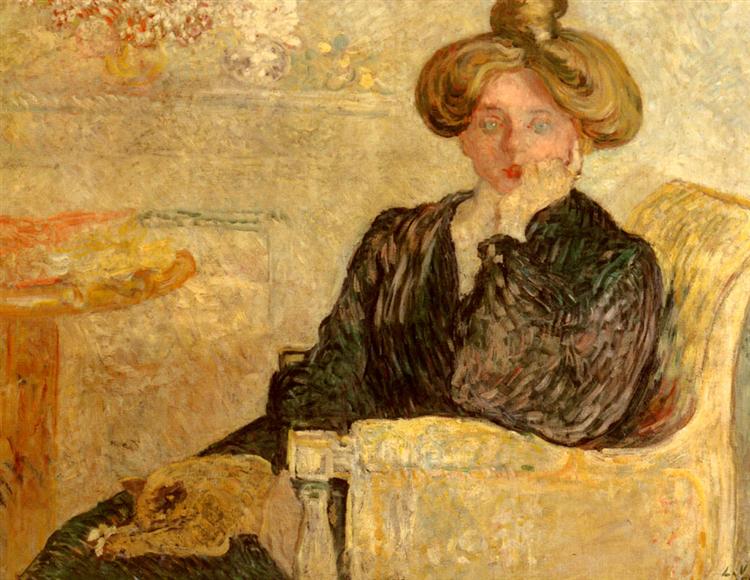Description
The painting "Woman in wheelchair" (1903) by Louis Valtat is a work that encapsulates the sensitivity of the artist towards the human figure and the expression of the emotional state through the colorful and vibrant palette of post -impressionist tones. In this work, we are presented with a woman who, despite her limited mobility situation, radiates a palpable dignity and strength.
Valtat, one of the exponents of the post -impressionist movement, displays in this painting his mastery in the composition and use of color, aspects that are evidence of his ability to capture the essence of the subject. The woman, dressed in a long clear outfit that contrasts with the darkest background, is the central focus of the work. His face, although serene, emanates a slight air of melancholy, suggesting both fragility and a strong will. This contrast between its tranquility and the vigorous use of color in the environment can be interpreted as a comment on the duality of the human condition.
The wheelchair, which occupies an essential place in the composition, not only serves as an element that defines the physical limitation of women, but also becomes a symbol of its independence. Being located outside the spectrum of a dramatic representation of suffering, the painting He moves away from tragic lyricism to, on the other hand, provide us with a more empowered vision of its existence. In this context, Valtat reveals his ability to address complex issues with subtlety, without falling into excessive sentimentality.
The bottom of the work, composed of soft and harmonious tones, complements the central figure. Loose brushstrokes and color application reveal the influence of impressionism and, at the same time, anticipate Fauvism, highlighting the search for expressive above the representative. The vibrant pallette that Valtat chooses establishes an atmosphere that invites reflection, absorbing the viewer in a dialogue about beauty and limitations.
In the field of art history, Valtat's work is significant within the evolution of modern art, where artists began to break with academicism conventions to explore new ways of seeing and feeling. "Wheel in a wheelchair" is inscribed within this search for emotional authenticity, a feature that unites Valtat with his contemporaries and who, however, resonates with a singular voice.
paintings Similar in the artistic canon can evoke this idea of representation and empowerment. Works of artists such as Henri Matisse or Vincent Van Gogh also use the human figure as a means to explore the relationship between being and its environment, although each one does from a unique perspective. In this case, Valtat not only represents a woman in a wheelchair; Rather, it offers us a splendid study on the intersection of fragility and strength, where the vision of the subject transcends his physical condition.
The richness of "woman in wheelchair" is an invitation to observe not only what is shown, but what is suggested. The work unfolds as an introspection field about life, dignity and the ability to find beauty in the midst of adversity, a subtle reminder that the depth of the human spirit is not measured by its mobility, but by its essence.
KUADROS ©, a famous paint on your wall.
Hand-made oil painting reproductions, with the quality of professional artists and the distinctive seal of KUADROS ©.
Art reproduction service with satisfaction guarantee. If you are not completely satisfied with the replica of your painting, we refund your money 100%.

